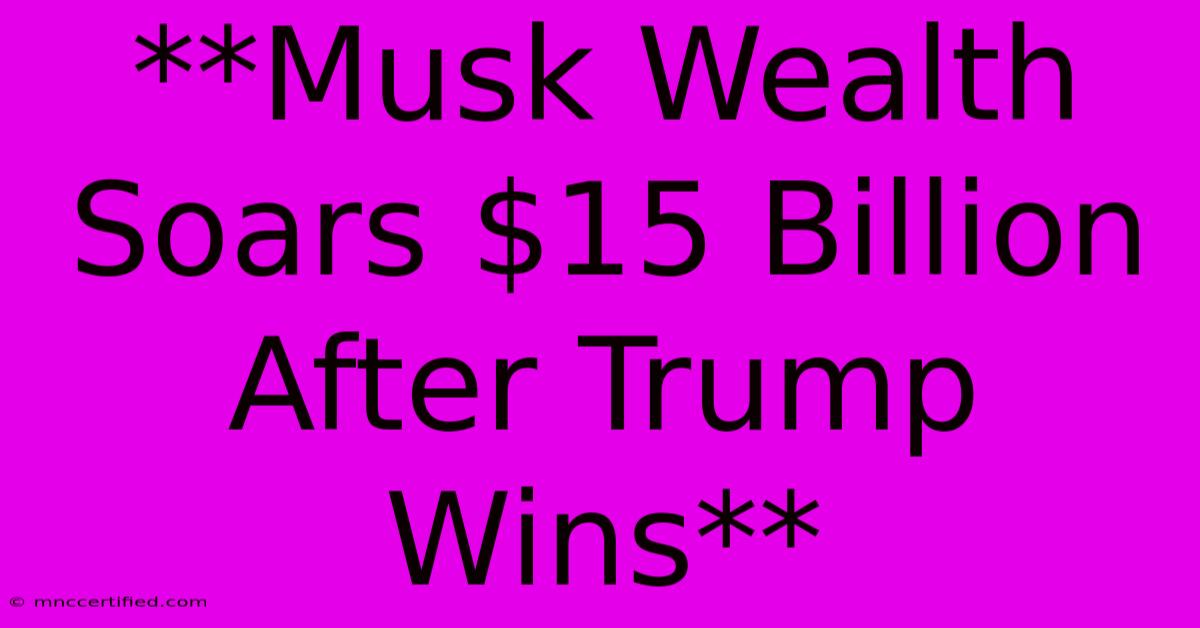**Musk Wealth Soars $15 Billion After Trump Wins**

Table of Contents
Musk Wealth Soars $15 Billion After Trump Wins: A Look at the Economic Implications
Elon Musk, the enigmatic CEO of Tesla and SpaceX, saw his personal wealth skyrocket by a staggering $15 billion in the immediate aftermath of Donald Trump's victory in the 2016 US presidential election. While the correlation between these two events may seem surprising, a closer look reveals a complex interplay of economic factors that contributed to Musk's windfall.
The Trump Effect: A Bullish Market for Tesla
The market reaction to Trump's victory was largely positive, with the Dow Jones Industrial Average surging by nearly 250 points on the day of the election. This bullish sentiment extended to the electric vehicle sector, where Tesla shares experienced a significant spike.
Several factors played a role in this surge:
- Regulatory Environment: Trump's campaign rhetoric promised to loosen environmental regulations, a favorable development for Tesla, which heavily relies on government incentives for its electric vehicles.
- Tax Cuts: Trump's tax cuts, primarily aimed at corporations, provided a boost to Tesla's bottom line and enhanced its financial flexibility.
- Infrastructure Spending: Trump's infrastructure plans, including a focus on roads and renewable energy, could further bolster demand for Tesla's vehicles.
Musk's Strategic Positioning: A Master of Timing
Musk's strategic decisions in the months leading up to the election also contributed to his wealth surge.
- Production Ramp-up: Tesla had been aggressively ramping up production of its Model 3, a crucial step in establishing itself as a mass-market automaker. The market's positive response to Trump's election fueled further optimism about Tesla's growth prospects.
- Market Perception: Musk had successfully cultivated a narrative of Tesla as a company poised for significant growth, positioning himself as a pioneer in the clean energy revolution. This narrative resonated with investors who saw Trump's policies as supportive of Tesla's goals.
Beyond the Market: A Complex Relationship
It's important to note that the relationship between Musk and Trump is complex and often contentious. While Musk has benefited from certain Trump administration policies, he has also been critical of the President's stance on climate change and environmental regulations.
Despite these differences, the 2016 election clearly had a significant impact on Musk's wealth. It highlights the interconnected nature of politics and the economy, and the role of perception and market sentiment in shaping financial fortunes.
The Future of Tesla and Musk: A Rollercoaster Ride
The impact of Trump's policies on Tesla and Musk's wealth remains to be fully understood. While the initial market response was positive, the long-term implications are still uncertain.
Moving forward, Tesla faces several challenges, including:
- Competition: Tesla is now facing increasing competition from established automakers, who are rapidly developing their own electric vehicle offerings.
- Profitability: Despite strong sales, Tesla has struggled to achieve consistent profitability, raising questions about its long-term sustainability.
- Geopolitical Risks: The global political landscape remains volatile, with trade wars and other uncertainties posing risks to Tesla's operations.
As Tesla navigates these challenges, Musk's wealth is likely to experience further fluctuations. The journey ahead for the electric car pioneer promises to be as exciting and unpredictable as ever.

Thank you for visiting our website wich cover about **Musk Wealth Soars $15 Billion After Trump Wins** . We hope the information provided has been useful to you. Feel free to contact us if you have any questions or need further assistance. See you next time and dont miss to bookmark.
Featured Posts
-
Watch Warriors Celtics Nba Live Free Today
Nov 07, 2024
-
Obsidian Specialty Insurance Company Naic
Nov 07, 2024
-
Trumps White House Visit Boosts Dogecoin 25
Nov 07, 2024
-
Insurance Claims Adjuster Jobs Houston Tx
Nov 07, 2024
-
Barry Bonds Topps 320 Error Card Value
Nov 07, 2024